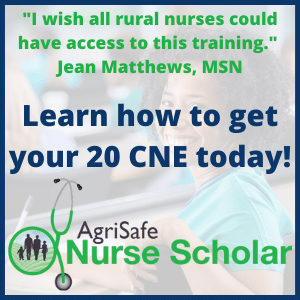What is cognition? A healthy brain is one that can perform all the mental processes that are collectively known as cognition, including the ability to learn new things, intuition, judgment, language, and remembering.
AgriSafe embraces a Total Farmer Health® model that includes cognitive health. Cognitive health supports effective decision making, problem solving, emotional regulation, relationship integration, situational awareness, behavioral choices, memory, and reality testing.
Strong cognitive health includes:
- Ability to focus
- Ability to avoid distractions
- Stable short-term and long-term memory
- Ability to process or acquire knowledge and understanding
If you feel your cognitive health is at risk, consider talking to a health care professional. Your work in agricultural production is likely a high-risk occupation with little room for error. Disorganization and distractions can lead to work injuries. Unaddressed stress, illness and aging can negatively impact the effective cognitive functioning of agricultural producers. If you experience slow cognitive processing, do not wait to get help.
If you or a loved one continues to farm into your senior years, that can be extremely rewarding. Just as you may delegate the heavy lifting to younger generations to protect your aging back, consider delegating cognitive tasks. For example, operating machinery that requires quick reaction time may be better suited for a younger family member (adults not youths). Instead, analysis of market reports or farm financials that require in-depth cognitive processing, but not quick reaction time, may continue to be easy for you. Everyone ages differently, and cognitive changes are also different for each person. Take time to understand your cognitive health and consider changes that can reduce your risk of injury. You should be able to farm as long as you want. After all, you’re a vital part of the farm operation.
Page updated: July 2021
Cognition Topics
Cognition Resources

What’s new in anxiety research?
Daniel Pine, M.D., studies how differences in our brains can affect our mental health. Through their work at the National Institute of Mental Health, Dr. Pine and his team want toRead More

Traumatic stress: New roads to recovery
We hear about traumatic or life-threatening events on the news all the time. They can include large events such as natural disasters and wars, or events like accidents, sexual abuse,Read More

To help an anxious child, start with their parents
The best way to help children with an anxiety disorder may be to help their parents first, a new NIH-funded study has found. Most children worry or feel anxious fromRead More

